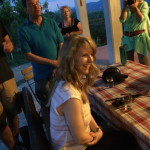Every year, I take our graduating senior class to lunch to check in with them, take their pulse, and give them a few encouraging words in this very pivotal year in their lives. One thing you will always hear me tell them, year after year, is contained in two words: STEP OUTSIDE.
This won't always mean the same thing for each individual student, nor should it.
As these seniors are grappling with the many decisions that can be overwhelming, I like to pile on and add one more to the mix: where and when will you step outside? This can of course include going across the street or across town -- if it takes you to a culture different than your own. This is a great place to start. But more than anything, I am talking about studying or spending time abroad -- preferably in a country where English is not the primary language.
The benefits and reasons for this are too many for one blog post, so let's begin with the obvious:
It will expand your world view.
No matter where you live, chances are you've been raised in a particular subculture. Every culture has them; it is a fact of life, just as your nationality is a fact. We absorb values from this subculture, and most of the time it is an unconscious process. Much of culture is unspoken; it is rather acted out on a daily basis -- so much so that we begin very early to make assumptions about life and about the rest of the world. It takes stepping outside our home subculture to discover that some of those assumptions were inaccurate at best -- sometimes wildly so.
Almost all ancient civilizations had coming of age rituals for both boys and girls. These were mandatory rites of passage in order for the child to be considered an adult. While most of those traditions have long since faded from modern culture, we would do well to include a phase in the life of a young man or woman that involves separation from the subculture for a time. In ancient times it was most often a test of survival in the wilderness; today it makes sense for it to be a period of time spent in a foreign culture.
Nothing prepares you for life like being forced to adapt to new surroundings, new ways of doing things, not to mention a new language. We English speakers -- whether in the US, UK, Canada, Australia, New Zealand, or other -- are incredibly spoiled by the fact that the world is busy learning our language. But relying on that fact deprives us of the opportunity to develop inner muscles that will never develop otherwise.
I asked my oldest son, who spent a semester studying Arabic in Morocco, what he had gained in the process. He replied with way more than I can include here, but here is one thing that struck me in particular:
"It was so important for me [as a white American] to learn what it's like not to be in the majority culture. I was forced to feel the differences, and I'm richer and stronger for it."
In future posts we'll explore more reasons why stepping outside will change your life. How has stepping outside changed yours?































